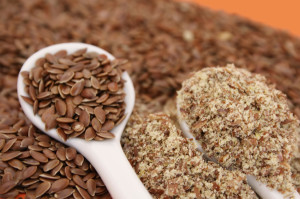Flaxseed may help reduce blood pressure: Encouraging results from a recent study have shown that adding flaxseed to the diet of people with high blood pressure (BP) resulted in a significant reduction in both systolic and diastolic pressures.
How much flaxseed may help reduce blood pressure?
A double-blind, placebo-controlled study showed a significant drop in BP (10mm Hg systolic and 7mm Hg diastolic) following six months of ground flaxseed (30g/day in bagels, muffins, and buns) being added to the diets of people with peripheral arterial disease (PAD).
Interestingly, over 80% of trial participants were on long-term BP medication. This is the largest drop in blood pressure due to a dietary intervention ever achieved.
Other benefits include lowering cholesterol and anti-inflammatory effects.
Flaxseed was selected for this study because previous animal studies had indicated effects ranging from anti-inflammatory to antiarrhythmic, antiarthrogenic and cholesterol lowering properties.
What’s in flaxseed?
Flaxseed, which is high in omega-3 fatty acids, is also rich in antioxidants, B vitamins, dietary fibre, protein, potassium and phytoestrogens called lignans. Alpha-linolenic acid, enterolignans, and fibre have all been shown to decrease BP, probably through the synergistic effect of these compounds.
Should I use Flaxseed Oil, Seed, or Meal?
Flaxseed oil must be stored in the fridge. Only grind the amount of whole flaxseed you will use that day, as the oil goes rancid quickly and benefit is lost. Flaxseed meal may be more convenient to use and is available in Health Food Stores.

Freshly ground flaxseed seeds are probably the ideal way to go. Use a coffee grinder or blender to make the meal and add it to smoothies, sprinkle over cereal, fruit or veges and salads through the day.
Flaxseed meal can also be used as a binder or egg substitute for those with egg allergies.
Cautions with flaxseed:
The high fibre in flaxseed is a bonus but it’s best to start slowly to avoid digestive upsets, such as cramping, bloating and loose stools. A gradual increase in daily amounts will avoid this problem.
Check with your prescribing doctor before introducing flaxseed to your diet if you are taking any of the following medications for: seizures, blood-thinning, blood sugar-lowering, cholesterol-lowering or topical steroids. You may need to be monitored whilst introducing flaxseeds to your diet as the high omega-3’s and fibre may effect the action of your medications.
Ref: http://newyorkintegrative.com/2012/11/08/impressive-antihypertensive-effects-with-flax-seed/
- Homeopathy for Waterlogged Plants and Gardens - 12/10/2022
- Allergies relieved with Homeopathy - 20/09/2020
- Homeopathic Travel Remedies First Aid Kit - 08/10/2019




Leave a Reply